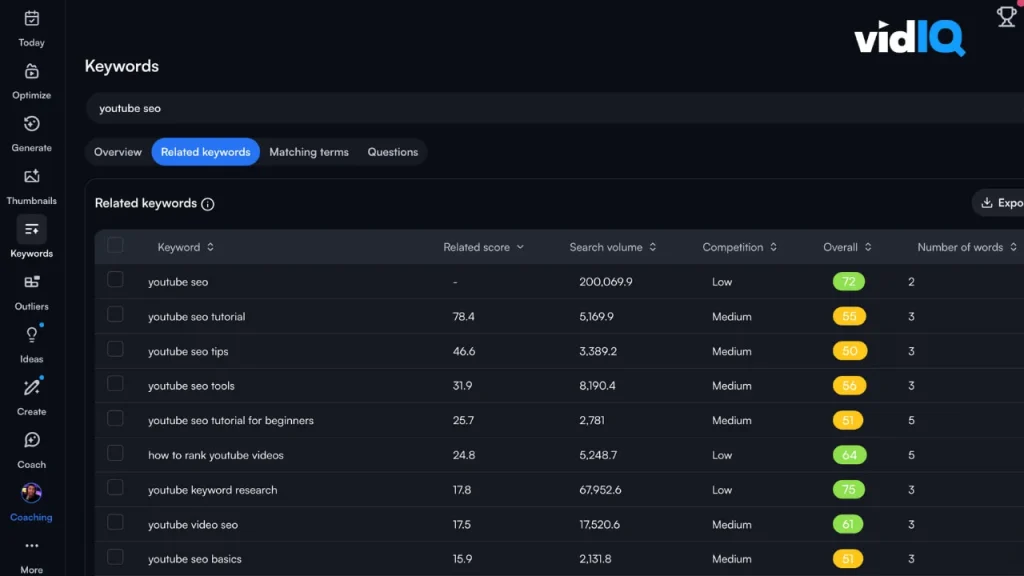In 2026, competition on YouTube is fiercer than ever. With over 500 hours of video uploaded every minute, standing out is more challenging than ever. Have you ever uploaded a video that barely got any views, despite putting in hours of effort? The key to breaking through isn’t just high-quality content—it’s knowing how YouTube’s algorithm works and optimizing your videos with the right keywords.
I’ve been optimizing YouTube videos and channels for years, and I’ve learned that proper keyword research can make or break a video’s success. In this guide, I’ll walk you through the best strategies, tools, and techniques to rank higher in YouTube searches and get more organic traffic.
Why Keyword Research Matters on YouTube
YouTube functions like a search engine, just like Google. People type in queries, and YouTube provides results based on relevance and engagement.
Why is keyword research essential?
- It helps YouTube understand your video’s topic.
- It increases your visibility in search results and suggested videos.
- It attracts the right audience—people actively searching for content like yours.
When I started optimizing videos, I noticed that choosing the right keywords could turn a video with a few hundred views into one with thousands or even millions. It’s all about matching your content with what people are searching for.
How YouTube’s Search Algorithm Works
To rank videos, YouTube considers:
- Relevance → Do your title, description, and tags match the search query?
- Engagement → Do people watch your video till the end? Do they like, comment, and share it?
- Watch Time → Longer watch duration signals high-quality content.
How Keywords Influence Rankings
YouTube scans your video’s metadata (title, description, tags, captions, and even spoken words in the video). If your content aligns with what people are searching for, it has a higher chance of ranking.
I’ve tested this—longer, in-depth videos (10+ minutes) tend to rank better, especially when optimized with relevant keywords and engaging storytelling.
Now that you understand how YouTube ranks content, the next step is knowing how to find the best keywords that align with your audience’s search behavior.
How to Find the Best Keywords for Your YouTube Videos
Finding the right keywords is a mix of strategy and research. Here are my top methods:
YouTube’s Search Autocomplete (Free & Effective!)
Simply type a broad topic in the YouTube search bar, and it will suggest the most searched phrases.
Example:
If you type “YouTube SEO”, you might see:
- YouTube SEO tutorial 2026
- YouTube SEO tips for beginners
- How to rank YouTube videos fast
These are real search queries that people are actively looking for.

Analyzing Competitor Videos
I always analyze top-performing videos across different niches to uncover keyword opportunities.
- Titles, descriptions, and tags → What keywords are they using?
- Repetition patterns → Are there specific terms appearing in multiple videos?
- Comments → What are viewers asking for? These can reveal valuable content ideas.
Using Keyword Research Tools
If you want deeper insights, tools like VidIQ and Google Trends help you:
- Find keyword search volume (how often people search for a term).
- Analyze keyword difficulty (how competitive a keyword is).
- Discover trending topics before they get saturated.
I’ve found that mixing keyword research tools with YouTube’s autocomplete gives the best results.

Understanding Search Intent in YouTube SEO
Not all searches are the same. Understanding search intent is critical.
- Informational Searches → How to edit YouTube videos
- Commercial Searches → Best microphone for YouTube videos
- Educational Searches → History of digital marketing
How to Optimize for Each Type of Search Intent
- Tutorials & How-to Videos: Use clear, instructional titles → How to Rank YouTube Videos in 2026
- Product Reviews: Focus on problem-solving → Best Budget Camera for YouTube 2026
- Listicles & Comparisons: People love top lists → Top 5 YouTube SEO Tools for Creators
By aligning your content with actual search queries, you increase your chances of ranking higher and attracting more viewers.
The Different Types of YouTube Keywords
Using the right type of keywords can help you rank faster.
- Broad keywords → “Recipes” (high competition, hard to rank).
- Mid-tail keywords → “Healthy recipes” (more specific, better ranking chances).
- Long-tail keywords → “Easy and quick healthy recipes” (less competition, higher conversion).
Why Long-Tail Keywords Are the Best for Small Channels
When I started working with YouTube channels, I quickly realized that long-tail keywords were the key to sustainable growth. They have less competition but higher intent, meaning they attract viewers who are actively searching for specific content.
By implementing this strategy across multiple client channels, we’ve been able to increase rankings, boost organic traffic, and drive consistent engagement. This approach has proven especially effective for newer channels looking to establish authority and gain visibility in competitive niches.
Where to Place Keywords for Maximum SEO Impact
YouTube scans multiple elements of your video. Here’s where to insert keywords for maximum impact:
- Title → Make it catchy and include your main keyword.
- Description → Use variations of your keyword naturally.
- Tags → Reinforce relevance but don’t overstuff.
- Captions & Subtitles → YouTube reads them.
- Timestamps → Helps with search rankings.
I always make sure the main keyword appears within the first 100 characters of my title and description.
Pro Tips for Better Keyword Research in 2026
Keyword research is evolving—what worked in 2023 may not work in 2026.
Here’s what’s changing:
- AI-driven search optimization → YouTube’s algorithm is smarter than ever.
- Voice search is rising → More people are using “Hey Google, show me…” searches.
- Short-form content (YouTube Shorts) is influencing search rankings.
What’s Working for Me and Our Clients Now
Through my work with YouTube creators and businesses, I’ve found that the best results come from a strategic mix of trending keywords and evergreen content.
By leveraging viral topics, we help channels gain quick visibility and engagement, while long-term SEO ensures sustained traffic and consistent growth.
This balanced approach allows our clients to rank higher, attract the right audience, and build a strong content foundation that keeps delivering results over time.
Mastering YouTube Keyword Research for Long-Term Success
- Keyword research is not just about ranking—it’s about making your videos discoverable for months or even years.
- Optimizing for search intent and long-tail keywords is the best strategy for growth.
- Consistently testing and refining your keyword strategy is the key to success.
Struggling to rank your YouTube videos? Get expert insights tailored to your channel. Book a YouTube Audit & Coaching Call with Yucalab today! Let’s unlock your channel’s full potential together.




